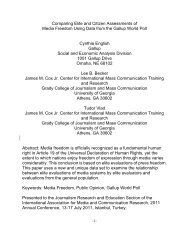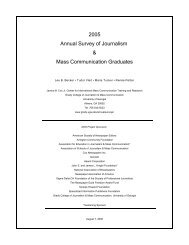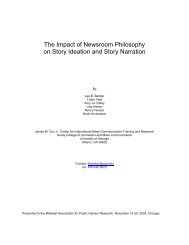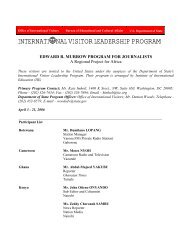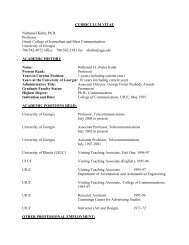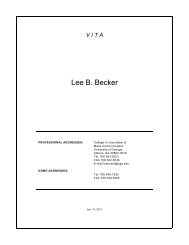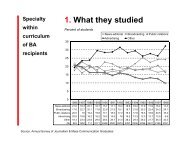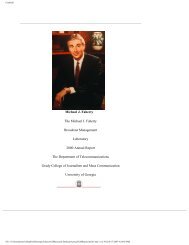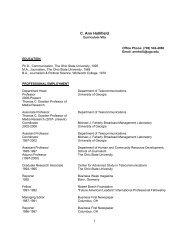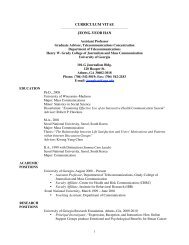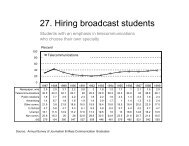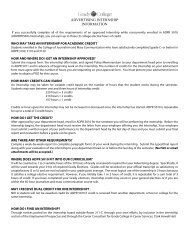Professionalism of News Workers - Grady College of Journalism and ...
Professionalism of News Workers - Grady College of Journalism and ...
Professionalism of News Workers - Grady College of Journalism and ...
Create successful ePaper yourself
Turn your PDF publications into a flip-book with our unique Google optimized e-Paper software.
<strong>Pr<strong>of</strong>essionalism</strong> <strong>of</strong> <strong>News</strong> <strong>Workers</strong>: The Creation <strong>and</strong> Evolution <strong>of</strong> the Concept Page 30<br />
tied to three important elements <strong>of</strong> the newspaper operation: to the attitudes <strong>and</strong> judgments <strong>of</strong> newsmen<br />
regarding their newspaper, to the performance <strong>of</strong> that newspaper, <strong>and</strong> to the desire to remain in<br />
newspaper work.<br />
The McLeod work, viewed as a whole, is ambiguous or underdeveloped in a second important<br />
way. It never fully deals with or integrates the second set <strong>of</strong> measures used, namely items designed to<br />
determine if the job held meets expectations. Early in the work, McLeod used these items, in comparison<br />
with the items measuring desire, to create an index <strong>of</strong> job satisfaction. In later work, the items are simply<br />
treated as a measure <strong>of</strong> working conditions. Both have promise, yet neither has been used in a<br />
significant way in the work since McLeod withdrew from the research area.<br />
Beam (1990) has quite correctly criticized the McLeod work for mixing levels <strong>of</strong> analysis. The<br />
original measure at the level <strong>of</strong> the journalist cannot be simply aggregated to create an organizational<br />
level concept, as McLeod <strong>and</strong> his students <strong>of</strong>ten did. Such measures might be part <strong>of</strong> an organizationallevel<br />
measure, but they are not sufficient for a variety <strong>of</strong> reasons, not least <strong>of</strong> which is that not all<br />
journalists in an organization have equal impact on the workings <strong>of</strong> that organization.<br />
The criticism <strong>of</strong> the use <strong>of</strong> the McLeod <strong>and</strong> Hawley items in international comparisons misses its<br />
mark, however, if pr<strong>of</strong>essionalism is viewed more neutrally. It isn’t necessarily a good thing to be a<br />
pr<strong>of</strong>essional in <strong>and</strong> <strong>of</strong> itself, in this view, but being a pr<strong>of</strong>essional may have positive consequences in<br />
terms <strong>of</strong> work performance.<br />
Discussions about pr<strong>of</strong>essionalism among mass communication workers <strong>and</strong> educators<br />
continues today at a rapid clip. Perhaps most striking is the effort by some in the occupation <strong>of</strong> public<br />
relations to wrap themselves in the pr<strong>of</strong>essional mantle. The work <strong>of</strong> McLeod has sometimes been<br />
referenced in this dialog.<br />
It would be unrealistic to expect that much <strong>of</strong> the scientific literature would have had impact on<br />
this discussion. Certainly the contemporary critical work in the sociological literature suggests that being<br />
a pr<strong>of</strong>ession is not necessarily good or bad. It is simply a way <strong>of</strong> gaining power.<br />
Yet the work <strong>of</strong> McLeod does <strong>of</strong>fer some suggestions here. If being pr<strong>of</strong>essional simply means<br />
valuing work that <strong>of</strong>fers one control, autonomy <strong>and</strong> independence, there is no reason to value this more



